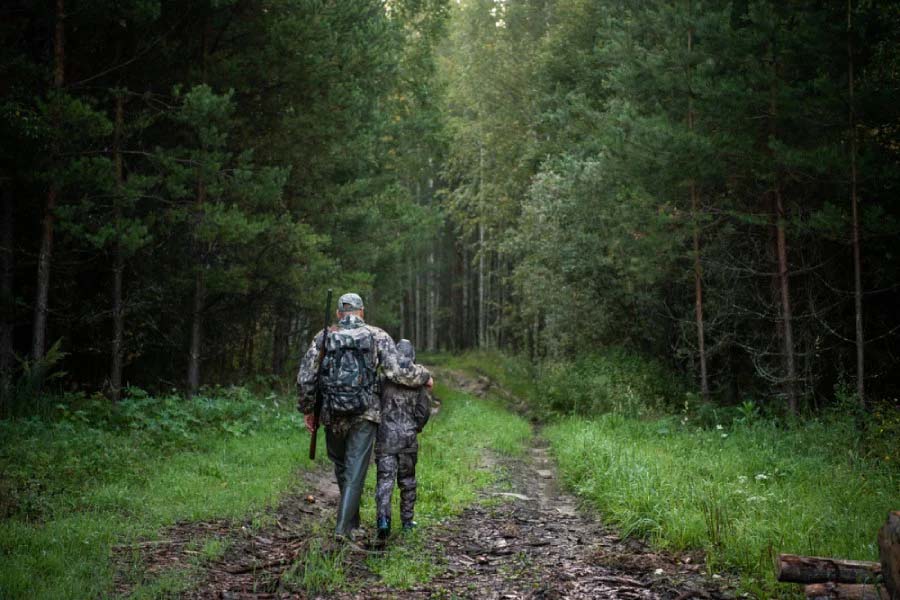A Beginner’s Guide to Essential Hunting Gear

Specialized Gear for the Type of Hunt
You may need a special weapon or ammo depending on your hunt. A rifle is a top choice for most game hunting, but you may opt for a bow and arrow or other weapon depending on the type of hunting and area you are in.
Beyond a weapon, your hunting gear list will vary based on the game you’re after:
Big Game:
-
Rangefinder: For determining the distance to your target.
-
Game Calls: Lure your prey closer.
-
Field Dressing Kit: Essential for cleaning your game.
Deer Hunting Gear:
-
Deer Calls and Scents: Essential for attracting these elusive creatures.
-
Safety Harness: If you're in a tree stand, safety first!
Choosing the Right Firearm for Your Hunt
Any hunter knows that you can’t discuss the gear you need for a hunt without working out the best weapon for the hunt. Making a wrong or uneducated decision in the firearm department can be the difference between taking home a trophy buck or coming home empty-handed.
Now, while you might think it's just a matter of having a powerful, accurate rifle, the truth of the matter is that there is a lot of consideration that needs to go into matching your firearm to your type of game, terrain, and the difficulty of the hunt.
So, whether you’re stalking deer in dense, wooded areas or upland hunting birds on open fields, knowing your best options is paramount.
Understanding Your Game
To start, you need to identify the best tool for your hunt. Different animals call for different weapons when it comes to actually hitting your shots:
-
Big Game (deer, elk, bear): Centerfire rifles are the gold standard for any big game. Popular calibers like .243 Winchester, .308 Winchester, and .30-06 Springfield provide the stopping power needed for success shots from variable distances. These rounds are known for their balance between recoil and ballistic performance, and are usually easily manageable and accessible for intermediate shooters.
-
Small Game (rabbits, squirrels): For smaller animals, there is a wider range of acceptable options depending on the game and end goal. A .22 Long Rifle or similar rimfire round is a good base option. These calibers are great for beginners, with low recoil, affordable options, and good accuracy for close-medium range targets.
-
Bird Hunting (turkey, pheasant, duck): Just about all bird hunting is shotgun territory. A 12-gauge is popular for a turkey or pheasant shotgun, whereas 20-gauge options are more appropriate for smaller game like dove and quail. Semi-auto or pump-action becomes more of a personal choice, again, depending on the type of hunt
Selecting the Right Firearm
There’s no one-size-fits-all option, but here’s a general breakdown of what works best for different styles of hunting:
-
Rifles: Distance and precision are the key here. Bolt-action rifles are a go-to for most big game hunters due to their durability and accuracy, especially when paired with a quality optic.
-
Shotguns: Highly versatile, shotguns can handle everything from upland birds to whitetail deer (with slugs). If you are looking for gear to use across several hunts, a shotgun is a good choice.
-
Handguns: Not typically a beginner’s choice, handguns do serve a purpose in specific hunts, like boar hunts, or as backup. That being said, handguns do require practice to use effectively and are subject to more legal scrutiny in most states.
Caliber & Gauge Tips
Its important that you are comfortable handling your firearm, but you also need to ensure your choice has enough power and range for what you’re hunting.
-
Bigger isn’t always better. Too much stopping power can lead to unnecessary recoil and poor shot placement, as well as damage to the animal and meat.
-
Be sure your go-to caliber or gauge is legal for the species and area you’re hunting in. State wildlife agencies will provide clear guidelines.
Legal, Safety, & Training Aspects
Never underestimate the importance of legal and safe firearm use in the field.
-
Always check local regulations for firearm type, ammo, and magazine limits.
-
Regular practice makes a huge difference when it comes to safe handling and accurate shooting.
-
Take a hunter safety course if you haven’t already—it’s one of the best investments you can make as a new hunter.
-
Store firearms securely and always transport them unloaded, preferably in a hard carrying case. This is crucial if you are on a multi-day hunt and you need your maintain your gear while in camp.
Hunter Essentials as Your Skills Grow
When you gain a deeper understanding of the wild and sharpen your hunting instincts, you'll realize that your gear needs to evolve with you. As you advance in your hunting journey, the essentials expand beyond the basics.
When you get a little more experienced, these will be hunting's essential gear options: Advanced optics with night vision capabilities for those dusk and dawn hunts, specialized clothing tailored for extreme conditions, and GPS devices to track both your route and the movement of game. Additionally, trail cameras will become indispensable, giving you a sneak peek into the animal's routines and patterns, and decoys to help in luring your prey.
The deeper you get into hunting, the more refined and specialized your gear will become, enhancing both your success rate and the overall hunting experience.
Pieces of Hunting Advice (That You May Not Want To Hear, But Should Remember)
-
Know Your Gear: Spend time with your hunting gear before your trip. Familiarity breeds confidence.
-
Safety First: Always let someone know where you’re hunting and when you expect to return.
-
Stay Patient: Hunting is almost meditative. It’s as much about patience as it is about skill in shooting.

